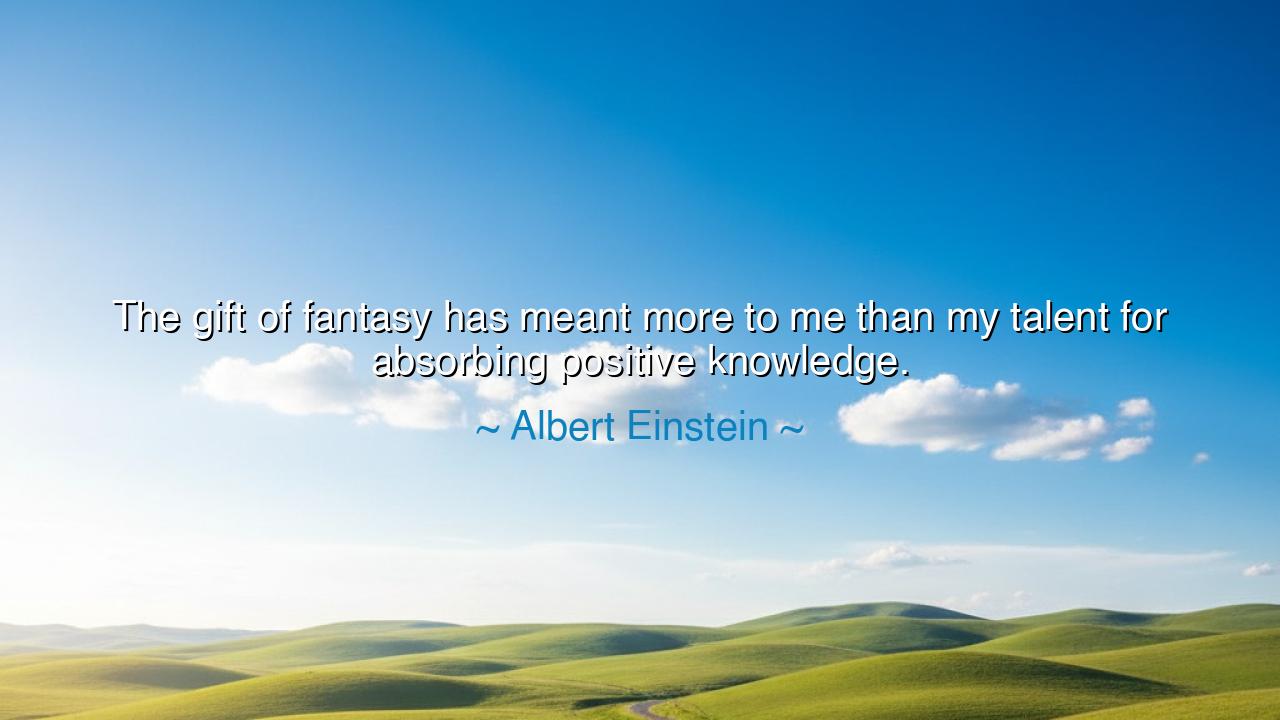
The gift of fantasy has meant more to me than my talent for
The gift of fantasy has meant more to me than my talent for absorbing positive knowledge.






Albert Einstein, the sage of modern science, once revealed a secret of his greatness: “The gift of fantasy has meant more to me than my talent for absorbing positive knowledge.” In these words, he lifts the veil from the heart of creativity, showing us that the true wellspring of discovery is not the mere accumulation of facts, but the living flame of imagination. For knowledge is a lamp, but fantasy is the spark that lights it. Without imagination, knowledge lies dormant, a library of unused books; with imagination, it becomes a force that reshapes the world.
The origin of this thought lies deep in Einstein’s own life. As a child, he was not the prodigy people now imagine. Teachers found him slow to answer, daydreaming in the classroom. But within him stirred the gift of fantasy, the power to envision what was not yet seen. He once imagined himself riding upon a beam of light, and from such visions would later be born the theory of relativity. It was not memorization that brought forth his genius, but the marriage of curiosity and fantasy, the courage to ask, “What if?”
History offers us many such examples. Consider Leonardo da Vinci, painter, engineer, dreamer. His notebooks are filled not only with careful observations, but with wild visions—flying machines, submarines, weapons of strange design. Most of these would never be built in his lifetime, yet his fantasy stretched the boundaries of what humanity could imagine. His knowledge was vast, but his imagination was greater still, and it is for that gift that he is remembered as a universal genius.
So too with great inventors and leaders. The Wright brothers did not succeed in flight because they memorized all the principles of mechanics alone. Many before them had such knowledge. What set them apart was the bold fantasy that man could soar like a bird. They dared to see what others thought impossible, and knowledge followed imagination into the sky. Their story, like Einstein’s, testifies to the truth: fantasy opens the door, knowledge builds the house.
The meaning of Einstein’s words is therefore profound: do not worship knowledge alone. Facts are tools, yes, but tools unused are lifeless. It is imagination, the gift of fantasy, that teaches us how to use them, that paints visions of new worlds, that inspires us to ask questions where no answers yet exist. Knowledge fills the mind; imagination frees the soul. Together they create wisdom, but without imagination, knowledge is sterile.
The lesson for us is clear. Nurture your fantasy as carefully as your education. Do not dismiss your daydreams, for within them may lie the seeds of greatness. Do not silence the childlike wonder that asks impossible questions. For it is often the “impossible” that becomes tomorrow’s truth. Balance study with wonder, facts with vision, logic with dreams.
Practical steps flow from this wisdom. When learning, ask not only “What is?” but also “What could be?” When solving problems, dare to imagine answers beyond convention. When guiding children, encourage not only memorization but creativity, play, and vision. Keep a journal of ideas, however wild they may seem. For the world is not moved forward by those who know the most facts, but by those who dare to dream the boldest dreams.
So let Einstein’s words echo across the ages: “The gift of fantasy has meant more to me than my talent for absorbing positive knowledge.” Cherish your imagination, for it is the golden key to all hidden doors. Guard it, cultivate it, and let it lead your knowledge into creation. For in the union of fact and fantasy lies the power to change not only your own life, but the destiny of mankind.






AAdministratorAdministrator
Welcome, honored guests. Please leave a comment, we will respond soon